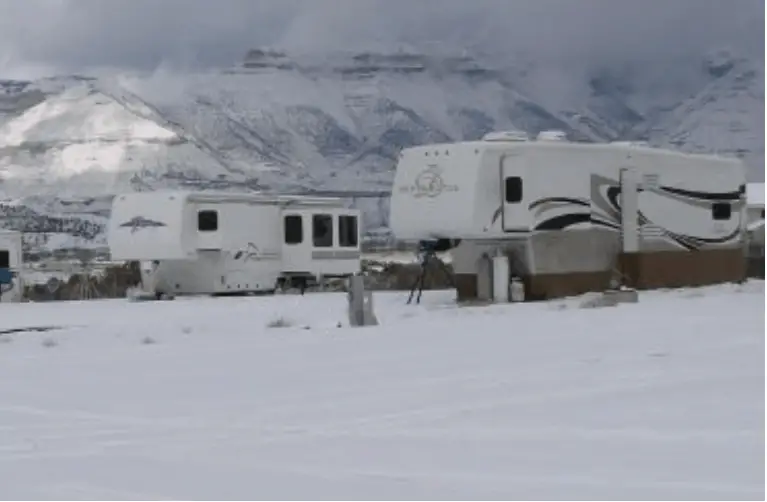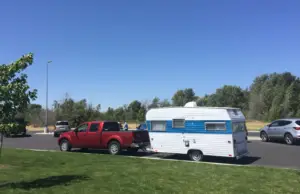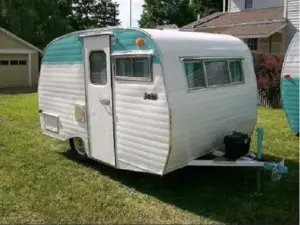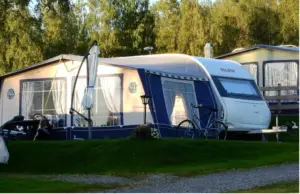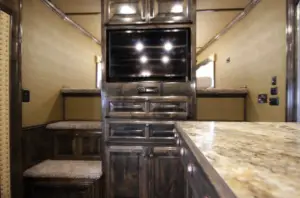Storing your RV outside in winter needs good preparation. Its always better to store an RV or motorhome inside a garage or shade. But, not all of us are able to do this.
If the RV is being stored outside, you need to take special care so that the RV stays in good condition through out those 3-4 months.
Some of the basic things to do include, covering the RV, Protecting the tires by covering them and making sure they don’t touch the ground by using plastic or wooden pads.
Batteries need special attention too. You should charge them fully before putting the RV for storage. Winterizing the RV in a proper way is much critical as otherwise pipes may get damaged.
Lets start with winterizing process and then go on to other important things.
Winterize The RV
Protecting your RV or travel trailers plumping system is utmost important aspect of RV winter storage. RV pipelines, tanks can get freeze if you skip this step. Low temperatures will freeze the water and eventually break the pipes or water tanks.
There are two ways how you can do this. First is to blow air through you pipelines and second is to use RV antifreeze. You can also use antifreeze after blowing the hot air though pipes.
Lets talk about the first method. For this you will need compressor that will blow the hot air. You need to connect a small hose into your RVs city outlet connection. You will need a small adapter to get the connection done.
Before you start with blowing the air make sure you empty the plumbing system. Run the water pump and make sure all water is gone. Turn on the hot and cold faucets to make sure water runs out from there. Similarly flush the toilet and turn on the shower head.
Read : How to prevent your RV pipes from freezing
Open the low valve and let the water flow. Similarly shut the water heater and release the valve to let the water flow out. You need to cut the water heater connection for this method.
Once all the water is flushed out, start the compressor. Then go to each of the points and turn them on. Let the air flow, it will flush out the remaining water too. Do this for about 10-15 seconds for each point.
Once you are done with all of the points, its time to pass through some antifreeze. Its optional in this case but its good if you do it. The pink liquid will definitely prevent the winter cold from damaging you RVs plumbing system.
You can connect the antifreeze gallon to the water pump through a hose and then start the pump. The turn ON each of the points so that the antifreeze passing through the whole line. DO this with external faucet or shower too.
In the second method you just pass the antifreeze through each of the points. You don’t have to pass the hot air. Total 4-5 gallons of antifreeze will depending on the size of your rv plumbing system
RV Internal Preparation
Apart from taking precaution to protect the RV plumbing system you also need thorough preparation for other internal things in the RV
Double-check The Plumbings
Check faucets, drains, bends and elbows for any left out water or moisture since these areas usually freeze out during the winter. Water tanks and water heater included. You can use any RV antifreeze for this issue. Get the specific antifreeze for RV and not any antifreeze available in the market and should be the pink-colored anti-freeze.
Remove Propane Tanks
Keep your propane tanks well covered with caps so that insects, dust, and dirt will not get through it. Storage of your propane tank should be in a well-ventilated place as well.
Squirrel And Rodent Control
Any animals, not only squirrels, and rodents can feel extreme cold during the winter. Some reptiles and insects can take refuge inside your RV. Squirrels and mice can be very destructive once they get access to your vehicle.
They can get inside your vehicle by burrowing into holes, cracks, or any openings they can find as they are brilliant in enlarging these small openings.
Once inside, they can chew on anything they can get their teeth on such as the cabinet, carpet, furniture, leftover food, and trash. They will also leave urine and droppings everywhere that will stain your RV and leave a foul smell after.
- What you can do is to check all holes and entrances in your RV. Plug all holes using foam insulation materials, aluminum wool, or any other stuff that won’t rust after a while but enough to keep the holes blocked.
- You may also place traps inside such as mouse traps and insect traps to at least catch invaders if they get inside your vehicle.
- There is also no harm in placing the same traps near tires or even on the roof if there are entryways available on these areas.
- We should place insect traps near burners or anywhere near propane lines as wasps, bees and other creepy crawlies can make their nests near these spots or areas.
Ants And Spider Proofing
Ants are not only noticeable during hot weather, but they are a problem all year round. They get to any crevice and corners of your RV and will multiply if given the chance. You can be ready by putting ant spray or ant traps around the kitchen, and cabinets or shelves.
Spiders can be as pesky as ants most especially if it multiplies inside your RV. It wouldn’t be a pleasant experience to have a spider crawl on you while you are sleeping. Best to stop its existence before anything else.
Other pesky insects that you also need to worry about are the bees and hornets. We can usually find them under the rig, or even under the trailer cover. So be aware of any holes or openings and signs of nesting before storage or even while in storage.
Remove Food
- You should rid your fridge and cabinets of food.
- Leave your refrigerator clean and defrosted before storage.
- Leftover food is a sure-fire way to attract animals as they have a very keen sense of smell and can smell food from a distance.
- Keeping your cupboards cleared of canned foods and other stuff that is chewable. Even crumbs spread around can be food for the animals who will surely be hungry during this season.
- Open the cabinet doors to refrain any insect from nesting inside and further multiplying, another way to make sure that your cabinet will not have an unpleasant smell while in storage – some baking soda in each corner will help.
- Do not leave any moisture from the wood cabinetry as this will also lead to bad smelling cabinets after a while.
- Remove any other item that can attract outside animals such as soap, spices, half-opened snacks, or pieces of fruits or vegetables.
Remove Other Common Material Inside Your RV
Shampoos, toothpaste, lotions have their expiration date so best to remove them before that time. They can also attract animals as they are good to chew on for them when they get access to your RV.
Remove tissue paper, paper towels, clothing, throw pillow, cushions, and old cloth because it can make these animals comfortable while inside your RV. It can also serve as their nesting place during the chilly weather.
Remove Any Valuable Items
If you have any extra sensitive appliances attached to your RV such as TV, high-tech electronics best to leave them inside your home. Remove all other materials such as gears for camping, fishing, and sporting gears. It is not just the thieves that may take them, but the frigid weather can also damage them.
Cleaning The Inside Of Your RV
Before storage, give it that extra cleaning it needs. Remove curtains, dust windows, and vacuum the entire area. Specifically vacuum under the table, corner, and crevices.
Disinfect, bleach, and scrub areas that need scrubbing so that every dirt will be removed and crumbs on the floor will not be left out. Bacteria and fungus will not have a chance during winter. It will leave your RV smelling good instead of the musty, pungy smell if left unclean.
RV External Preparation
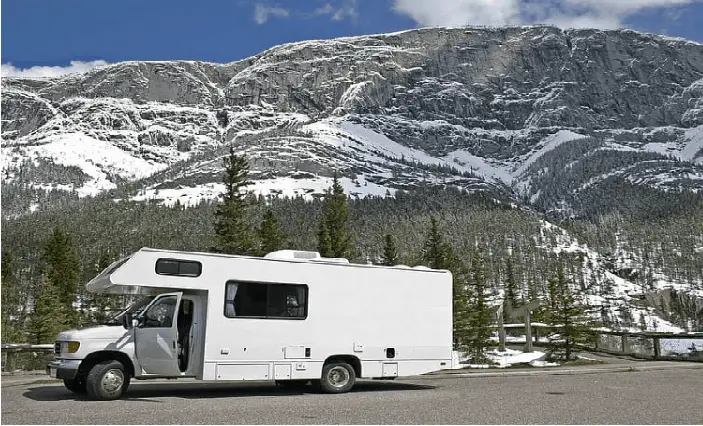
Wash before storing your RV. You need to wash sides, roof, windows, doors, wheels, tires and watch out for the growth of mildews or molds. You should inspect every seal, roof, and body seams. Be sure to dry your RV after.
Do Not Forget The Awnings
Keep your awnings clean and dry to prevent mold or mildew from thriving on it. Brush with soft-bristle, lukewarm water with a soap solution, and then rinse after. You may dry it with a soft, clean cloth or have it air-dried before retracting and getting it ready for winter storage.
Proper awning maintenance will prevent it from getting stuck midway during the next camping season.
Look After The Slides
It is best if you retract your slides during the winter to prevent any insects and rodents from getting inside access. Clean your slides, then lubricate them.
It is also not advisable to leave RV slides open during the winter because the weather seals can get damaged due to the extreme weather, once damaged the leaks can cause moisture to get inside the living quarters.
If in case you have some stuff lying around that keep you from closing the slides, you may have to move it out of the way and close your RV slides. There is also no guarantee that your slides will hold out during winter even if it is parked outside your property. Here are my 3 tips to keep the RV slide outs in good condition.
Wax Your RV: You can choose for a quality wax to use on your RV, many products in the market will keep your RV intact while in winter storage.
Check All Moving Parts: Hinges, bearings, and locks should be well lubricated.
Protect Your Tires
As with any other parts of the RV, tires are prone to damage too. There is a lot that goes into protecting your RV or travel trailer tires.
- It should be well covered during the winter. Check with your RV dealer for the right coverage for your tires.
- Some also believe in removing tires of the RV to prevent flat spots but it is always up to you, if you’d rather not remove the tires, you may move your RV once or twice a month.
- Be sure to place a plank of wood or any solid protection from the ground and your tires. If there are concrete surfaces around, this is better compared to the bare ground.
- While you’re at it, consider spraying your tires with anti-rust and corrosion spray. You can get a WD-40 for this purpose.
- Check the tire inflation and do it as recommended on the RV manual.
Check Batteries
You need an efficient, working battery after the winter so you have to do some preparation as well for your batteries.
You may leave the battery intact as long as you will top it up once every a month for at least 8 hours, make sure that batteries are charged because you don’t want a discharged battery who will only freeze during winter.
Read : Using Solar to Charge RV Batteries
The water level should also be adjusted and checked. However, if you are planning to keep your RV stored for some time, it is ideal to remove the batteries (after charging it ) and store it in a cool dry place where it will not freeze.
Make sure batteries are fully charged. Normally batteries will drain around 1-2% per month even when not in use. Make sure all parasitic loads are cut off otherwise there will more drain.
You can plug the RV once a month or so to recharge the batteries. I had published a full detailed article on how to store your RV batteries the right way in winter. There are a lot of things you need to consider its not only about fully charging the batteries, do check it out.
Stabilize The RV’s Fuel And Oil
You may need to add a special solution to your oil and fuel before storage that will keep both from freezing. This is available in the marketplace and purchases one that is made for RV.
Get The Necessary Cover
It may not be necessary to cover your RV if it will be placed in a sheltered location, but if it will just be staying outside, you may need to get the coverage that fits RV specifications.
It should not be a covering that is not breathable, which may cause moisture after some time. Moisture, as we all know, causes rust and corrosion to metal and other mechanical parts and moisture causes mold to grow.
Plastic is not an ideal covering as it easily causes moisture to pool under the covering, tarp material, on the other hand, is not also a suitable replacement. It should be a custom-designed cover that is for RV use during such weather.
Breathable covers prevent mold when the RV is covered. Do get a cover that wont cause the issues themselves. My complete analysis on pros and cons of rv covers is all you need to read, do check it out.
Customized cover has straps that you can wrap around the RV and you can also request a zipper as strategic openings for when you would like to enter and check your RV.
Pick A Suitable Spot To Park Your RV During The Winter
If you are to park your RV outside your property, the above tips should be observed. This is the most cost-effective way to park your RV among the other options.
Another way to park your RV is by renting parking spaces or RV storage, all for a certain fee. Outdoor parking space offers a lower price for parking. It will depend on your preference and your budget.
Here Are Your Storage Options
Storing the RV outside makes it prone to damages and other issues. But, one can spend a little bit and opt for other storage. Lets check out you options for storing the RV.
Park It In Your Property
For some, this is possible to do, especially those living in rural areas. But there are other places where parking your RV in front of your property is prohibited such as in suburbs or urban areas. This is ideal as well because you need not shell out extra money to store your vehicle.
RV Storage Facility
There are plenty of RV storage facilities to choose from nationwide, some offer covered parking while others do not have that advantage. They also offer maintenance during winter and such. This is an advantage for you because you need not check up on your RV every week as they will do this task for you.
You May Have Your RV Rented
If you don’t want to have an issue about storage and would rather have it running on the road, have it rented by relative perhaps or a close friend and you get to earn extra while waiting for the winter to pass. Make sure you have papers drawn up for signing during the process. It is also the best idea if you want the RV not freezing in any storage facility.
General Storage Facility
There are also storage facilities that can accommodate your RV. Some store vehicles as well in these facilities.
They provide the storage area for your RV less than the maintenance or winter maintenance service. Check for any facility near your area because you don’t want to travel a thousand miles to get access to your RV.
Checking On Your RV While In Storage
It is ideal to check on your RV once in a while when it is in storage. A quick inspection would be an enormous help as you check for any damage to or outside the vehicle, be aware of any water seepage or uncommon odor inside the van. You can check inside and outside for any unusual activity or changes so you can spot any problems before it arises.

